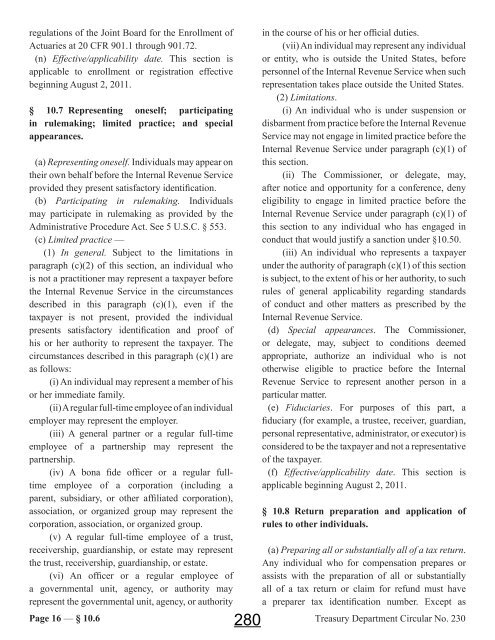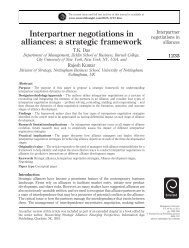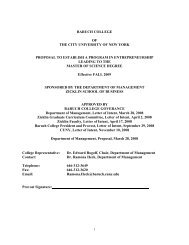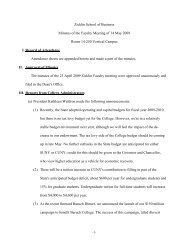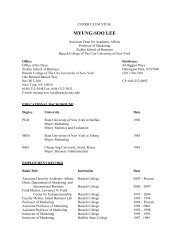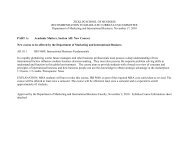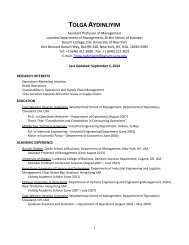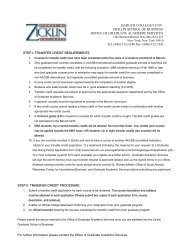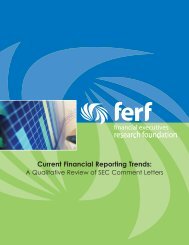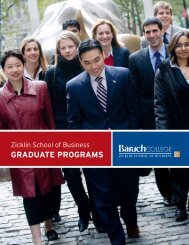Tax Seminar #3 – December 3 2012
Workbook - Zicklin School of Business
Workbook - Zicklin School of Business
You also want an ePaper? Increase the reach of your titles
YUMPU automatically turns print PDFs into web optimized ePapers that Google loves.
egulations of the Joint Board for the Enrollment of<br />
Actuaries at 20 CFR 901.1 through 901.72.<br />
(n) Effective/applicability date. This section is<br />
applicable to enrollment or registration effective<br />
beginning August 2, 2011.<br />
§ 10.7 Representing oneself; participating<br />
in rulemaking; limited practice; and special<br />
appearances.<br />
(a) Representing oneself. Individuals may appear on<br />
their own behalf before the Internal Revenue Service<br />
provided they present satisfactory identification.<br />
(b) Participating in rulemaking. Individuals<br />
may participate in rulemaking as provided by the<br />
Administrative Procedure Act. See 5 U.S.C. § 553.<br />
(c) Limited practice —<br />
(1) In general. Subject to the limitations in<br />
paragraph (c)(2) of this section, an individual who<br />
is not a practitioner may represent a taxpayer before<br />
the Internal Revenue Service in the circumstances<br />
described in this paragraph (c)(1), even if the<br />
taxpayer is not present, provided the individual<br />
presents satisfactory identification and proof of<br />
his or her authority to represent the taxpayer. The<br />
circumstances described in this paragraph (c)(1) are<br />
as follows:<br />
(i) An individual may represent a member of his<br />
or her immediate family.<br />
(ii) A regular full-time employee of an individual<br />
employer may represent the employer.<br />
(iii) A general partner or a regular full-time<br />
employee of a partnership may represent the<br />
partnership.<br />
(iv) A bona fide officer or a regular fulltime<br />
employee of a corporation (including a<br />
parent, subsidiary, or other affiliated corporation),<br />
association, or organized group may represent the<br />
corporation, association, or organized group.<br />
(v) A regular full-time employee of a trust,<br />
receivership, guardianship, or estate may represent<br />
the trust, receivership, guardianship, or estate.<br />
(vi) An officer or a regular employee of<br />
a governmental unit, agency, or authority may<br />
represent the governmental unit, agency, or authority<br />
Page 16 — § 10.6<br />
280<br />
in the course of his or her official duties.<br />
(vii) An individual may represent any individual<br />
or entity, who is outside the United States, before<br />
personnel of the Internal Revenue Service when such<br />
representation takes place outside the United States.<br />
(2) Limitations.<br />
(i) An individual who is under suspension or<br />
disbarment from practice before the Internal Revenue<br />
Service may not engage in limited practice before the<br />
Internal Revenue Service under paragraph (c)(1) of<br />
this section.<br />
(ii) The Commissioner, or delegate, may,<br />
after notice and opportunity for a conference, deny<br />
eligibility to engage in limited practice before the<br />
Internal Revenue Service under paragraph (c)(1) of<br />
this section to any individual who has engaged in<br />
conduct that would justify a sanction under §10.50.<br />
(iii) An individual who represents a taxpayer<br />
under the authority of paragraph (c)(1) of this section<br />
is subject, to the extent of his or her authority, to such<br />
rules of general applicability regarding standards<br />
of conduct and other matters as prescribed by the<br />
Internal Revenue Service.<br />
(d) Special appearances. The Commissioner,<br />
or delegate, may, subject to conditions deemed<br />
appropriate, authorize an individual who is not<br />
otherwise eligible to practice before the Internal<br />
Revenue Service to represent another person in a<br />
particular matter.<br />
(e) Fiduciaries. For purposes of this part, a<br />
fiduciary (for example, a trustee, receiver, guardian,<br />
personal representative, administrator, or executor) is<br />
considered to be the taxpayer and not a representative<br />
of the taxpayer.<br />
(f) Effective/applicability date. This section is<br />
applicable beginning August 2, 2011.<br />
§ 10.8 Return preparation and application of<br />
rules to other individuals.<br />
(a) Preparing all or substantially all of a tax return.<br />
Any individual who for compensation prepares or<br />
assists with the preparation of all or substantially<br />
all of a tax return or claim for refund must have<br />
a preparer tax identification number. Except as<br />
Treasury Department Circular No. 230


